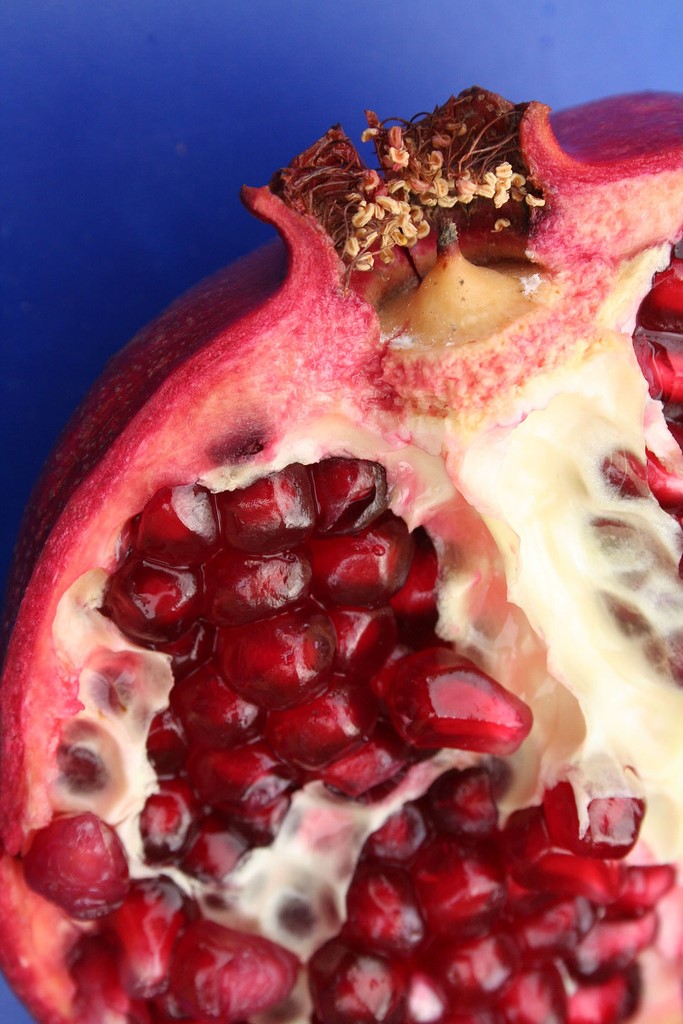اللهُمَ إنَّا نَعُوذُ بِكَ مِن جَهْدِ البَلاءِ ودَرْكِ الشَّقَاءِ وسُوءِ القَضَاءِ وشَمَاتَةِ الأعْدَاءِ
POMEGRANATE
رُمَّانٌ : قال تعالى:{فِيهِمَا فَاكِهَةٌ وَنَخْلٌ وَرُمَّانٌ} (الرحمن : 68) ويُذكر عن ابن عباس موقوفاً ومرفوعاً: (ما مِن رُمَّانٍ من رُمَّانِكم هذا إلا وهو مُلقَّحٌ بحبَّةٍ من رُمَّانِ الجَنَّةِ) والموقوفُ أشْبَهُ. وذكر حَربٌ وغيره عن علىٍّ أنه قال: (كُلُوا الرُّمَّانَ بِشحْمِه، فإنه دباغُ المَعِدَةِ). حلوُ الرُّمَّان حار رطب، جيدٌ للمَعِدَة، مقوٍ لها بما فيه من قبْضٍ لطيف، نافع للحلق والصدر والرِّئة، جيدٌ للسُّعال، وماؤه مُلَيِّن للبطن، يَغْذى البدن غِذاءً فاضلاً يسيراً، سريعُ التحلُّل لرِّقَّته ولطافته، ويُولِّد حرارة يسيرة في المعدة وريحاً، ولذلك يُعين على الباه، ولا يصلح للمَحْمُومين، وله خاصيَّة عجيبة إذا أُكل بالخبز يمنعه من الفساد في المعدة.وحامضه بارد يابس، قابض لطيف، ينفع المَعِدَة الملتهبة، ويُدِرُّ البَوْل أكثرَ من غيره من الرُّمَّان، ويُسكِّنُ الصَّفْراء، ويقطع الإسهال، ويمنع القىء، ويُلطِّف الفضول، ويُطفىءُ حرارة الكبد، ويُقَوِّى الأعضاء، نافع من الخَفَقان الصَّفراوى، والآلام العارضة للقلب، وفم المعدة، ويُقوِّى المَعِدَة، ويدفع الفُضول عنها، ويُطفئُ المِرَّة الصفراء والدم وإذا استُخرجَ ماؤه بشَحْمه، وطُبِخَ بيسير من العسل حتى يصير كالمرهم، واكتُحِلَ به، قطع الصفرة من العَيْن، ونقَّاها من الرطوبات الغليظة، وإذا لُطخ على اللِّثَة، نفع من الأَكلة العارضة لها، وإن استُخرج ماؤهما بشحمهما، أطلَق البطن، وأحْدَر الرُّطوباتِ العَفِنَةَ المُرِّية، ونفع مِن حُميَّات الغب المُتطاوِلة. وأما الرُّمَّان المزُّ، فمتوسط طبعاً وفعلاً بين النوعين، وهذا أمْيَلُ إلى لطافة الحامض قليلاً، وحَبُّ الرُّمَّان مع العسل طِلاءٌ للداحِس والقروح الخبيثة، وأقماعُه للجراحات، قالوا: ومَن ابتلع ثلاثةً من جُنبُذِ الرُّمَّان في كل سنة، أمِنَ مِنَ الرَّمد سنته كلَّها
Allah Said in Quran: "In them (both) will be fruits, and date palms and pomegranates". (55:68) Ali Bin Abi Talib Radi Allaho Anh was reported to have said: "Eat pomegranate with its pulp, because it coats the stomach".
Sweet pomegranate is hot and wet, good for the stomach, and strengthens it because of its being a mild constipating agent. It is good for the throat, chest and lungs, along with relieving coughing. The water (or juice) in the pomegranate softens the stomach and is a nutrient for the body. It digests quickly because it is light and produces heat along with some air in the stomach. It helps increase the semen production and is not favorable for those who have fever. Pomegranate has a special quality, that is, when one eats bread with it, it prevents it from being spoiled.
Bitter pomegranate is cold and dry and constipates mildly. It is in addition good for overheated stomach and helps produce more urine than the other types of pomegranate. It softens yellow bile symptoms, relieves diarrhea, prevents vomiting and is slightly tarry. It in addition stops the heat in the liver, strengthens the organs, helps against bilious shaking, heartaches and the ache of the tip of the stomach, it helps the stomach, rids it of excrements, extinguishes the excessive yellow bile, and benefits the blood. When pomegranate’s juice is extracted and is cooked with some honey until it becomes like an ointment and used as eye drops, it will clear the yellow color from the eye and will dissipate the thick wetness. When it is placed on the gingival (gums), it will help against the rashes that appear on the gingival. In addition, pomegranate juice extracted with its rind will work as a laxative and will rid the body from septic bilious moistures, along with helping against short-term fever. As for sour pomegranate, its qualities are in the middle between the two other kinds we mentioned, although this kind leans more towards being sour. Pomegranate seeds that are mixed with honey will alleviate septic finger and malignant ulcers. Pomegranate flowers help to heal wounds. It is said that if one swallows three pomegranate flowers each year, he will be immune from Ophthalmia (conjunctivitis) for an entire year.

